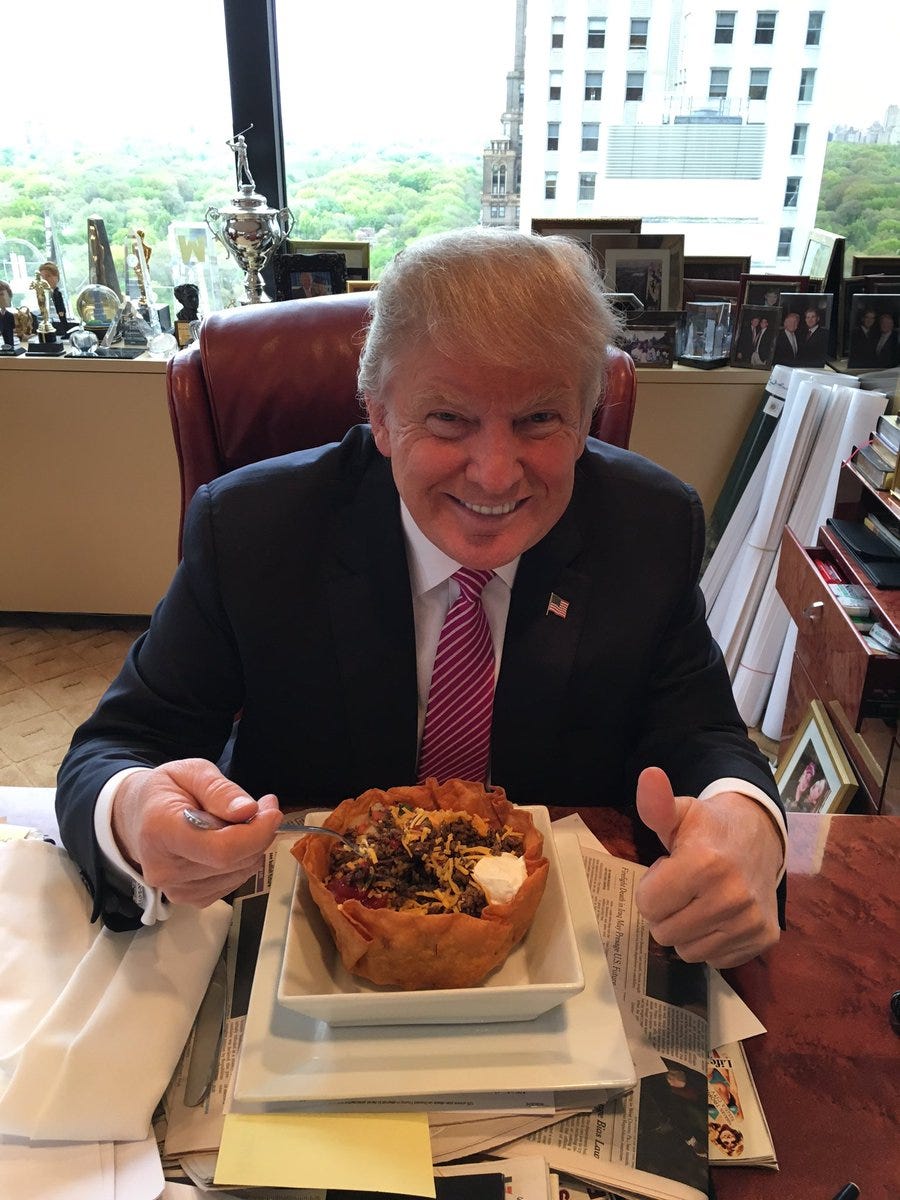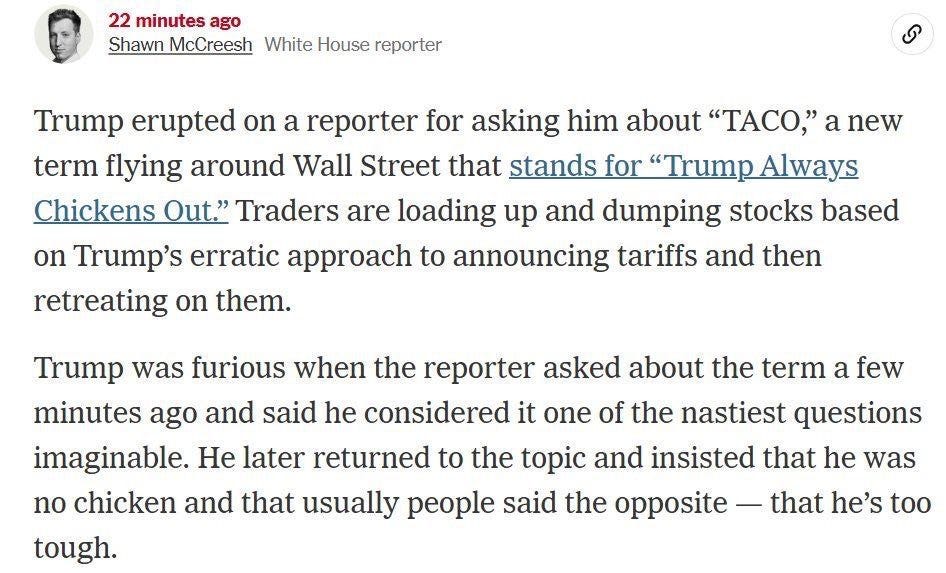The Chicken Little Effect: The TACO trade
The acronym, recently coined, stands for Trump Always Chickens Out
If Chicken Little tells you that the sky is falling
Even if it wasn't, would you still come crawling
Back again?
I bet you would my friend
Again, and again, and again, and again
- Living On The Edge, Aerosmith
Financial Times columnist Robert Armstrong coined the phrase TACO Trade out of the acronym Trump Always Chickens Out for the track record of President Trump taking a hard line posture with tariffs or similar negotiating stance, and then backing off. The premise is pretty simple: markets will plummet when Trump threatens trade war, and rebound when he relents.
His fans will call this “The Art of the Deal” or 4-D chess or the like, his detractors will call it something less flattering - political flip-flopping or being wishy-washy or mercurial, or if they’re feeling more aggressive they’ll say he’s inept or senile or other perjoratives - but well, at this point, this kind of negotiating strategy is kind of predictable. The generic term for it is anchoring - taking an outrageous initial stance and then backing off to a reasonable position.
“Wild threats by Trump are not unusual. Given the damage the U.S. would do to itself with this tariff, he will probably not follow through.”
- Salomon Fiedler, of Berenberg
Sure enough, stock markets jumped on Tuesday, with the S&P 500 posting its biggest gain in weeks.
The index rose more than 2 percent, which analysts attributed to President Trump’s pushing off a threatened 50 percent tariff on the European Union that he had proposed only a few days earlier.
For those not familiar the children’s story Chicken Little is more or less a folk tale about a chicken who believes the world is ending after an acorn falls on her head, prompting her to panic and spread alarm - which she is determined to tell the King or the whole world about, and eventually she whips a whole lot of others into a mob who are then all taken advantage of and/or eaten depending on which parable you’re reading. It’s used to describe someone who overreacts to a minor issue, exaggerating its severity and causing unnecessary fear or chaos. The story is basically intended to warn against hysteria and jumping to conclusions without evidence, or to taking things out of proportion, or to being easily flummoxed by loudmouths.
Now, the phrase “chickening out” is of similar etymology - it means to be easily panicked, as the main character in the Chicken Little story epitomizes. This isn’t really a reasonable characterization of Trump’s behavior - he’s not exactly scared of the situation - but he is, rationally, backing off from undesired consequences.
“These retreats are so frequent that investors should rationally expect them.”
- Paul Donovan, of UBS Wealth Management
While President Trump is fond of this particular negotiating tactic - it would behoove him to have more than this particular maneuver in his repertoire. It does draw attention, it is high-profile, but if it generally ends the same way it loses strength as a credible measure and becomes just Kabuki theater.
Trump’s known for bold opening moves and bombastic statements (oh boy, is he!) He could propose ambitious, even unrealistic, terms (e.g., demanding complete trade barrier removals) to shift the Overton window, making his actual goals seem reasonable. But this requires clear follow-through to avoid credibility loss. He would - in the manner of his beloved Godfather films - have to make an example of someone.
Trump could offer targeted concessions, like access to U.S. markets or technology, in exchange for specific commitments from counterparts. For example, promising relaxed regulations for foreign investment in the U.S. to secure manufacturing commitments abroad. This builds goodwill while maintaining pressure, unlike tariffs which can escalate tensions.
Though this hasn’t been the stance thus far, coalition-building would be a solid move. Instead of unilateral tariffs, Trump could form alliances with like-minded nations to pressure adversaries collectively. For instance, coordinating with EU or Indo-Pacific nations on tech export controls against China creates a united front, amplifying leverage without direct economic cost to the U.S.
He’s had some luck with creating artificial urgency, though again this is only as valid as both sides insist on it being and it would have to be enforced at least once before anyone would really take it all that seriously. But at least hypothetically, President Trump could set firm deadlines for negotiations or limit offers (e.g., “This trade deal is only on the table for 60 days”). This creates urgency, forcing counterparts to act quickly or risk losing opportunities, a tactic he used in North Korea talks.
At least in theory, Trump should have the information advantage in most cases - though he doesn’t often spend the time to educate himself to act on it. But at least on paper, he could use either “open source” or three-letter-agency variety of intelligence-gathering to understand counterparts’ domestic pressures or economic weaknesses, using this to tailor demands. For example, knowing a country’s reliance on U.S. agricultural imports could lead to precise concessions without broad tariffs. To be fair, mostly this would fall to the State Department and traditional diplomats, but Trump likes to take a direct hand - so he should be armed for it; my primary concern here is that he doesn’t particularly seem to want to as he likes to “wing it” in general.
And then there’s the sort of vague vibes-and-charisma bit. Trump excels at shaping narratives. He could frame negotiations as “America First” wins, using media to pressure opponents by rallying domestic support. Publicly praising a counterpart’s cooperation (or hinting at their intransigence) can shift dynamics without economic cost. Trump’s charisma and direct engagement (e.g., summit-style meetings with leaders like Kim Jong-un) can build trust or unsettle opponents. Hosting foreign leaders for high-profile negotiations at Mar-a-Lago, for instance, could create a favorable environment to extract concessions. But this seems like it can be tricky, because this has not always turned out as clear a win as one might have hoped.
Update: Trump, unsurprisingly, hates this term.
It’s somehow vaguely reminiscent of the part of Back To The Future 2 where Marty McFly is mortally offended by being called a chicken. Well, I suppose that’s why it’s foreign bankers that coined the phrase.





He always realises he might screw something up so steps back
I hadn’t heard that acronym before. Hilarious.